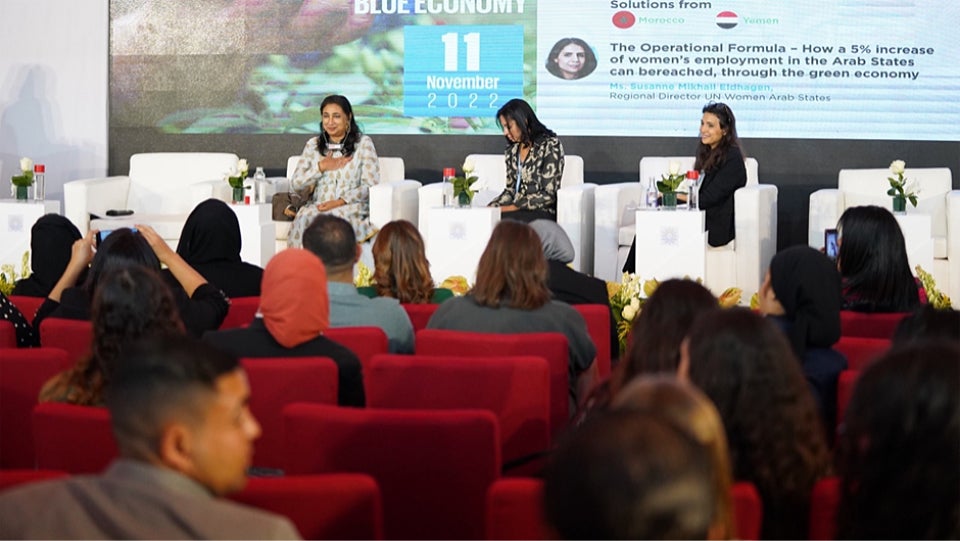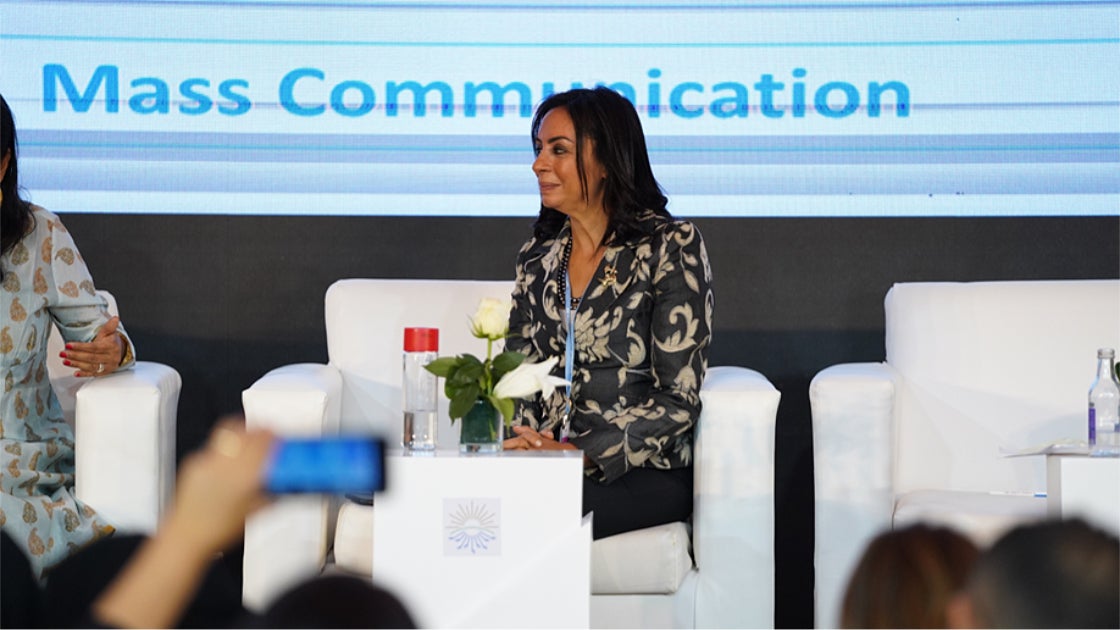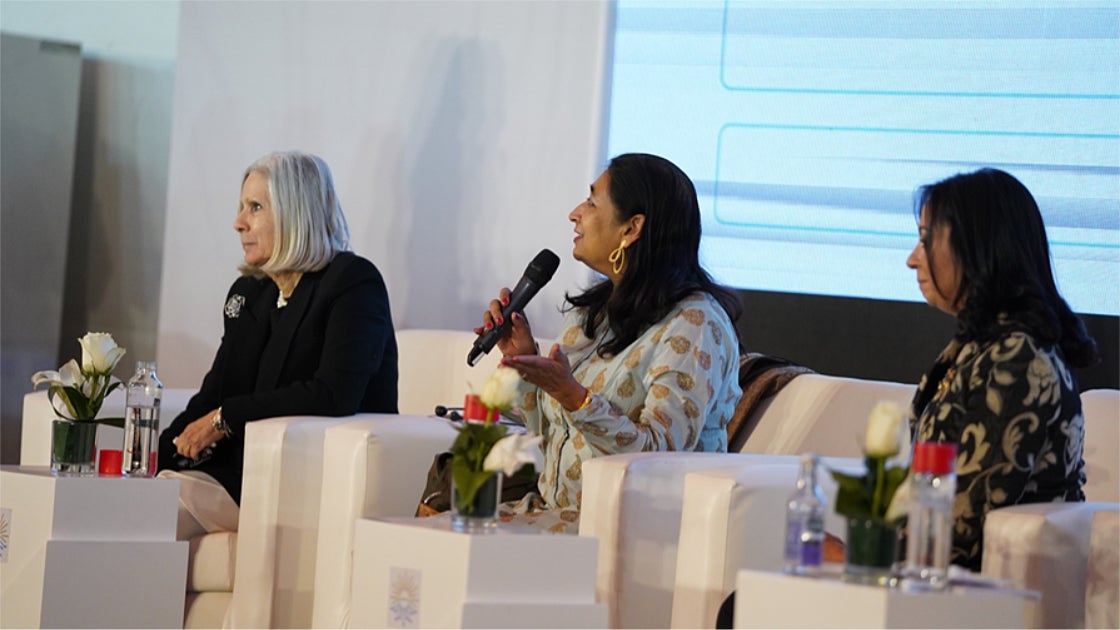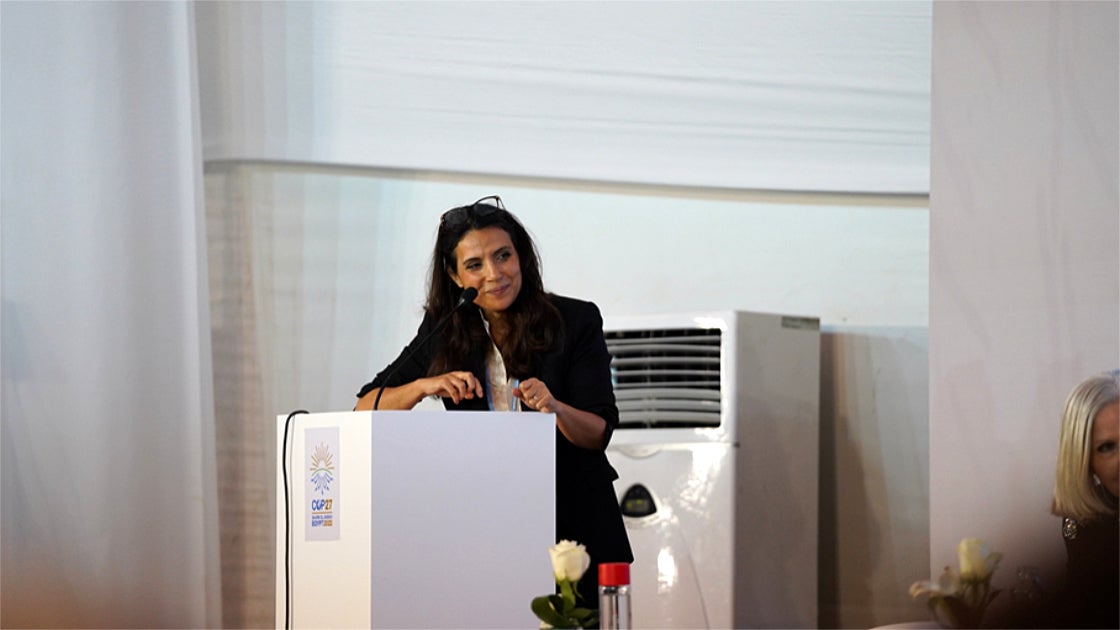UN Women and the League of Arab States at COP27: Addressing climate change in the Arab States through surging women’s employment in the green and blue economy
Date:
Author: Reem Akl

In 2022, and within the framework of the 66th Session of the Commission on the Status of Women, a new regional commitment to empower all women and girls in the context of climate change, environment and disaster risk reduction has been unprecedently agreed by twenty-two Member States of the League of Arab States (LAS).
The pact of LAS Members States, stretching across North Africa, the Levante and the Gulf, committed to on overarching programme with UN Women, titled ‘Achieving gender equality and the empowerment of all women and girls in the context of climate change, environmental and disaster risk reduction’. The programme is to address climate change through surging women’s employment in areas pertinent for climate change adaptation.
The COP27 side-event, titled ‘Addressing Climate Change in the Arab States Through Surging Women’s Employment in the Green and Blue Economy’, brought the panelists to discuss the way forward of such a programme and the methodologies of scaling up female employment and labour force participation in tackling and addressing climate change in the Arab States. The Arab States region has one of the widest gaps between educational attainment (96.2 per cent) and economic participation and opportunity (46.0 per cent), a striking paradox that makes a commitment to accelerating women’s access to the economy more relevant than ever before.
The panelists of the session included gender equality and women’s empowerment experts, including Dr. Maya Morsy, President of Egypt’s National Council for Women; Ms. Anita Bhatia, Assistant-Secretary-General and UN Women Deputy Executive Director; H.E. Ambassador Dr. Haifa Abu Ghazaleh, Assistant-Secretary-General, Head of Social Affairs Sector at LAS; and Ms. Susanne Mikhail Eldhagen, Regional Director of UN Women in the Arab States. The session was divided into four key topics tackled by each of the panelists.

Following her opening remarks, Dr. Maya Morsy addressed the importance of scale, women’s employment and financial inclusion within the context of the Egyptian green economy. She referred to the hosting state’s efforts with regards to women’s economic empowerment and promoting the green economy discourse among the private sector and governmental institutions. “We aim to reach 30 per cent more jobs in the green and blue economies. Women’s participation in both economies is very critical, and therefore achieving a minimum of 30 per cent new jobs in the green and blue economies is a vital necessity,” Dr. Morsy highlighted.

Ms. Anita Bhatia reflected on how the region can finance the inclusion of millions of women into the green economy. In her remarks, Ms. Bhatia highlighted that, “In a number of countries there are still laws that prohibit women from owning, inheriting or passing on real property. Which is why it is very difficult for women if, they can’t own land, to have collateral when they go to seek a bank loan. Laws have to be changed and women must have equality in access to resources, like land.” She emphasized that while women are the most impacted by climate change, they can still offer the greatest set of solutions to tackle the current issue at hand. “It is really important that we ensure they have financial access, capacity building and technical assistance to grow,” she continued.
Subsequently, H.E. Dr. Haifa Abu Ghazaleh discussed the Arab States’ drive towards scaling female employment in the green and blue economy. In her presentation, Dr. Abu Ghazaleh stressed on the regional political commitment that needs to be scaled and the available opportunities through which the region can invest in the green economy.
More importantly, economic opportunities and educational attainment are two primary indicators through which the Arab States can assess this form of inclusion. H.E. said: “In 2022, a regional and political commitment was made in order to further advance women’s empowerment within the green and blue economies. Such a commitment, which was initiated jointly with UN Women Regional Office for the Arab States, and that places increasing women’s labour force participation in the heart of its agenda, will play a vital role in laying out and developing policies for women’s empowerment in the Arab States.”

UN Women Regional Director for the Arab States, Ms. Susanne Mikhail stressed on the level of urgency through which the region needs to act, highlighting: “From now until 2030, more than 50 million women would need to be pulled into the labour force within the region, and in the coming 10 years, we expect that 70 per cent of new jobs will be in Science, Technology, Engineering and Mathematics (STEM) which is a great opportunity for women in the Arab States who graduate at vast volumes from these exact four faculties.”
Ms. Mikhail also highlighted that the three primary economies through which women’s employment can be further amplified and scaled are the green economy, the care economy and the STEM economy.
The side-event was concluded with strong emphasis by all panelists on the urgency to speed and scale women’s labour force participation in the region, and how the green economy is considered a steppingstone and an entry point through which Arab women’s employment can surge. Immediately after the COP27 side event, the regional programme to surge women employment in the Arab states was initiated by developing Country Specific Business Plans for the first batch of six countries participating in the first phase of the programme.